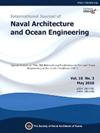Comparative study on ammonia and liquid hydrogen transportation costs in comparison to LNG
Abstract
Since ammonia and liquid hydrogen are the optional future shipping cargo and fuels, the applicability was crucial using the current technologies and expectations. Existing studies for the economic feasibility of the energies had limitations: empirical evaluation with assumptions and insufficiency related to causality. A distorted estimation can result in failure of decision-making or policy in terms of future energy. The present study aimed to evaluate the transportation costs of future energy including ammonia and liquid hydrogen in comparison to LNG for overcoming the limitations. An integrated mathematical model was applied to the investigation for economic feasibility. The transportation costs of the chosen energies were evaluated for the given transportation plan considering key factors: ship speed, BOR, and transportation plan. The transportation costs at the design speed for LNG and liquid hydrogen were approximately 55% and 80% of that for ammonia without considering the social cost due to CO2 emission. Although ammonia was the most expensive energy for transportation, ammonia could be an effective alternative due to insensitivity to the transportation plan. If the social cost was taken into account, liquid hydrogen already gained competitiveness in comparison to LNG. The advantage of liquid hydrogen was maximized for higher speed where more BOG was injected into main engines.

 求助内容:
求助内容: 应助结果提醒方式:
应助结果提醒方式:


